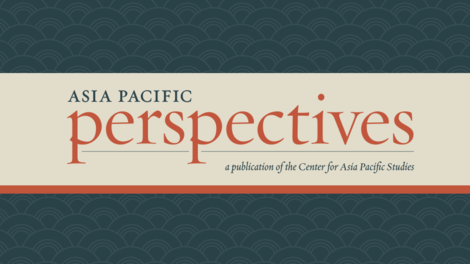
Editor’s Introduction

We are pleased to announce the publication of the Spring/Summer 2018 issue of Asia Pacific Perspectives. This issue highlights the inventive ways that scholars in the humanities and social sciences are looking at climate change and environmental issues in the Asia Pacific region.
The Spring/Summer 2018 issue considers climate change and the influence of the environment on the lives of the peoples and cultures of the Asia Pacific. Whether through the continued relevance of traditional fengshui forests in the lives of contemporary Chinese villagers or the detrimental effects of climate change and industry on the Philippines, these papers encourage us to reflect on the impacts of our actions on the environment and how the choices we make can influence our world and that of our neighbors. With this issue, we present the multifaceted ways in which the scholars and activists are bringing attention to the environmental challenges facing communities in East Asia and Southeast Asia today and the variety of approaches people are taking to mitigate environmental crises.
In the feature article for this issue, Christopher R. Coggins (Bard College at Simon's Rock) and Jesse Minor (University of Maine at Farmington) explore how contemporary Chinese villages’ preservation of traditional fengshui forests as “sacred groves” contribute to watershed management, biodiversity conservation, and climate change mitigation in their communities. This study builds on the understanding of the fengshui forest complex as an important social-ecological phenomenon in Chinese communities’ efforts to sustain their environmental well-being both past and present.
How does climate change impact communities, especially in island nations such as the Philippines? Our graduate student paper for this issue provides a comprehensive overview of the Philippines’ topography and industry and the environmental challenges facing its people today. Heather Tribe’s study reveals the nexus between climate change, public health, and the economy, especially among marginalized groups, and asks us to consider whether enough is being done or if it is simply too late to avoid the detrimental effects of increased environmental and climatic pressures on these communities.
Think Pieces
We are pleased to present two think pieces in this issue, both designed to give our readers an idea of the environmental challenges facing communities in India and the Philippines and the responses from grass root organizations working to effect change.
Photo Essay
In “Wave,” M. R. Hasan narrows our focus to reveal what life is like for a community living along the river in Bangladesh. His vivid photos expose the extremes within the landscape as its inhabitants face a climate that includes floods and drought, and soil salinity and erosion. Many, unable to cope with the economic insecurity of their environment, have become climate refugees.
Book Review
In this issue’s book review, Stephanie A. Siehr (University of San Francisco) reads Eco-Criticism in Japan, edited by Hisaaki WAKE, Keijiro SUGA, and Yuki MASAMI. This edited volume explores representations of the environment and nature through the lens of Japanese literature and film. Providing a diversity of voices, ranging from a poet to a professor of socio-environmental studies, the book adds another dimension to the study of the environment in the Asia Pacific, both past and present.
As always, we hope that these articles will stimulate further discussion and research on the topic and promote positive change. We appreciate the collaboration of our new editorial board in bringing this special issue on climate change and the environment in the Asia Pacific to fruition. Thanks to Dr. Leslie Woodhouse for the time and energy she has devoted to communicating with our authors and her dedication to maintaining the high standards of our journal.
Melissa S. Dale, Editor

